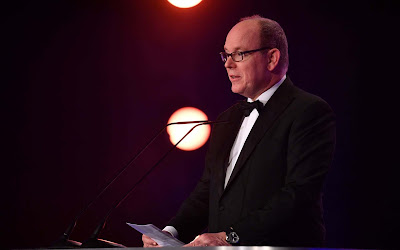Prince Albert of Monaco warns
Prince Albert of Monaco warns of 'irreversible tragedies' against the oceans of the world with up to 500 'dead zones'
(share this with your friends)
Urgent action is needed to prevent "irreversible tragedies" in the world's oceans due to plastic pollution and climate change. Prince Albert II of Monaco said at a large conference that there are already 500 "dead zones".
The Prince told the meeting of academics, senior officials and ministers in Edinburgh that the threats facing the oceans are becoming 'increasingly alarming' and that people have to stop believing that it is possible to do 'everything and anything' in them 'without effects'.
His open warning was repeated by Peter Thomson, UN Special Envoy to the Ocean, who compared the situation with all the historic architecture in the capital of Scotland that was swept away by a massive earthquake.
He said the world's oceans were in "deep, deep problems" and studies had identified 400 to 500 so-called "dead zones" - areas that do not have enough oxygen to support marine life.
This is usually caused by an increase in chemical nutrients, leading to excessive algae blooms that reduce the oxygen content under water.
If this is not checked, it is estimated that by 2050 the amount of plastic in the world's oceans outweighs the fish and that the equivalent of four trucks with plastic waste is added to the sea every minute.
The conference was held at the University of Edinburgh by the Monaco Blue Initiative, a think-tank that brings experts and policy makers together to find practical solutions.
It was founded by the foundation of the Prince and the Oceanographic Institute. The last body is part of the foundation named after his great-great-grandfather, Prince Albert I, who devoted a great deal of his life to oceanography.
Prince Albert II, often referred to as' the green prince 'for his efforts to tackle climate change and ocean pollution, used his opening speech to warn that rapid action was needed to' meet man's needs with those of nature '. the face of increasing threats.
He said: "As long as there is time, we must make every effort to prevent irreversible tragedies, tragedies that we see on the horizon as we observe the deterioration of costly, fragile ecosystems, the spread of plastic pollution and the daily disappearance. of different plant and animal species. "
He called for a "respectful" approach to the world's waters and said: "We must stop taking the ocean for granted in the belief that the ocean is permanent and that we can take it and pour everything and everything into it without consequences."
The prince praised a series of initiatives that have shown a "spirit of collective responsibility," such as the Paris Agreement, but said that this should now be extended "beyond diplomatic and political circles" to business and civil society.
M Thomson, a Fiji diplomat who was president of the UN General Assembly until last September, told the conference that the death of coral reefs was a "perceptible tragedy" in his country.
He said: "It would be akin to someone from Edinburgh who sees all these beautiful buildings that we are surrounded by just demolished in an earthquake one day."
But Mr. Thomson argued that technology meant that in 2021 there could be "massive data collection" from the seas to measure temperature and acidification.
He said that this could mean that "sensors and transmitters are placed on the hull of every pleasure boat, every commercial vessel, every buoy, every beacon in the world" and that a forthcoming UN conference for the first time "law on the high seas "will create that relates to everyone".
Dominic LeBlanc, the Canadian Fisheries Minister, told the conference that further discussions will take place at the June G7 summit in Quebec and a ministerial meeting in the autumn that aims to improve the observation of the sea and reduce unauthorized fishing. .
Originally published by Simon Johnson at The Telegraph
Kind regards, Pierre
(share this with your friends)
Urgent action is needed to prevent "irreversible tragedies" in the world's oceans due to plastic pollution and climate change. Prince Albert II of Monaco said at a large conference that there are already 500 "dead zones".
The Prince told the meeting of academics, senior officials and ministers in Edinburgh that the threats facing the oceans are becoming 'increasingly alarming' and that people have to stop believing that it is possible to do 'everything and anything' in them 'without effects'.
His open warning was repeated by Peter Thomson, UN Special Envoy to the Ocean, who compared the situation with all the historic architecture in the capital of Scotland that was swept away by a massive earthquake.
He said the world's oceans were in "deep, deep problems" and studies had identified 400 to 500 so-called "dead zones" - areas that do not have enough oxygen to support marine life.
This is usually caused by an increase in chemical nutrients, leading to excessive algae blooms that reduce the oxygen content under water.
If this is not checked, it is estimated that by 2050 the amount of plastic in the world's oceans outweighs the fish and that the equivalent of four trucks with plastic waste is added to the sea every minute.
The conference was held at the University of Edinburgh by the Monaco Blue Initiative, a think-tank that brings experts and policy makers together to find practical solutions.
It was founded by the foundation of the Prince and the Oceanographic Institute. The last body is part of the foundation named after his great-great-grandfather, Prince Albert I, who devoted a great deal of his life to oceanography.
Prince Albert II, often referred to as' the green prince 'for his efforts to tackle climate change and ocean pollution, used his opening speech to warn that rapid action was needed to' meet man's needs with those of nature '. the face of increasing threats.
He said: "As long as there is time, we must make every effort to prevent irreversible tragedies, tragedies that we see on the horizon as we observe the deterioration of costly, fragile ecosystems, the spread of plastic pollution and the daily disappearance. of different plant and animal species. "
He called for a "respectful" approach to the world's waters and said: "We must stop taking the ocean for granted in the belief that the ocean is permanent and that we can take it and pour everything and everything into it without consequences."
The prince praised a series of initiatives that have shown a "spirit of collective responsibility," such as the Paris Agreement, but said that this should now be extended "beyond diplomatic and political circles" to business and civil society.
M Thomson, a Fiji diplomat who was president of the UN General Assembly until last September, told the conference that the death of coral reefs was a "perceptible tragedy" in his country.
He said: "It would be akin to someone from Edinburgh who sees all these beautiful buildings that we are surrounded by just demolished in an earthquake one day."
But Mr. Thomson argued that technology meant that in 2021 there could be "massive data collection" from the seas to measure temperature and acidification.
He said that this could mean that "sensors and transmitters are placed on the hull of every pleasure boat, every commercial vessel, every buoy, every beacon in the world" and that a forthcoming UN conference for the first time "law on the high seas "will create that relates to everyone".
Dominic LeBlanc, the Canadian Fisheries Minister, told the conference that further discussions will take place at the June G7 summit in Quebec and a ministerial meeting in the autumn that aims to improve the observation of the sea and reduce unauthorized fishing. .
Originally published by Simon Johnson at The Telegraph
Kind regards, Pierre







Comments
Post a Comment
Thank you for your response
Kind regards Pierre